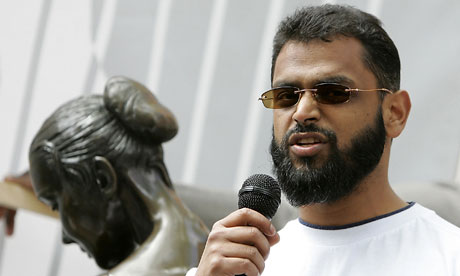WikiLeaks cables show US U-turn over ex-Guantánamo inmate
Washington shown lavishing praise on Moazzam Begg over his campaign for Europe to take in other detainees

The US has made a startling U-turn over the former British Guantánamo detainee Moazzam Begg, heaping praise on a man it accused only a few years ago of being a terrorist.
An American ambassador in Europe applauded in a leaked cable Begg's campaign to persuade European countries to take in remaining Guantánamo detainees.
Cynthia Stroum, ambassador to Luxembourg, acknowledges the irony of lavishing praise on Begg, who was alleged by the US to have been an instructor at an al-Qaida training camp in Afghanistan. In a cable labelled "To Hell and Back: Gitmo ex-detainee stumps in Luxembourg", Stroum wrote that Begg was "barnstorming" through Europe. In January this year, he met the Luxembourg government and spoke at a public meeting.
"Mr Begg is doing our work for us and his articulate, reasoned presentation makes for a convincing argument. It is ironic that after four years of imprisonment and alleged torture Moazzam Begg is delivering the same demarche to GOL [the government of Luxembourg] as we are: please consider accepting GTMO detainees for resettlement."
The cable is one of thousands offering insights into a massive US campaign led by the US secretary of state, Hillary Clinton, to coax reluctant countries around the world to take detainees. The cables show US diplomats resorting to flattery, pressure and financial inducements but still meeting with snubs, particularly from Europe.
The cables reveal extraordinary proposals for resolving the dilemma, such as a suggestion by Kuwait to dispose of the detainees by dropping them into the middle of a war zone. Almost as bizarre, though more humane, is a Saudi proposal to plant electronic chips in their bodies to track them after release.There are 174 detainees left in the Guantánamo camps, which were established in 2002 and held 775 at their peak. Of those remaining, the US has said it plans to hold about 60-80 with a view to putting some on trial and keeping others in indefinite detention. It is looking for homes for the remainder.
Barack Obama promised to close Guantánamo by January this year but was unable to fulfil the pledge.
In a lengthy passage of praise for Begg, who was held for four years and whose release in 2005 was reportedly opposed by the FBI and the CIA, Stroum said: "Rather than stressing past injustices he focused on what to do now."
In spite of Begg's efforts, Stroum said, Luxembourg was not prepared to take detainees, a fairly common position among European countries.
One of the most alarming suggestions was offered by the Kuwaiti interior minister, Sheikh Jaber al-Khaled al-Sabah, in a meeting with a US ambassador in February last year. The ambassador expressed concern about releasing more Guantánamo detainees to Kuwait, citing Abdullah al-Ajmi, who returned to Kuwait but was reported to have blown himself up in a suicide attack in Mosul, Iraq, in 2008.
According to the cable, Jaber told the ambassador: "You know better than I that we cannot deal with these people. I can't detain them ... If they are rotten, they are rotten and the best thing to do is get rid of them. You picked them up in Afghanistan; you should drop them off in Afghanistan, in the middle of the war zone."
The White House chief counter-terrorist adviser, John Brennan, heard another unusual proposal from Saudi Arabia's King Abdullah at his palace in March this year.
Discussing how to deal with detainees, Abdullah interjected: "I've just thought of something." He proposed "implanting detainees with an electronic chip containing information about them and allowing their movements to be tracked with Bluetooth. This was done with horses and falcons." Brennan replied: "Horses don't have good lawyers." Brennan said such a proposal would face legal hurdles in the US but he would look into it.The next day Brennan held another discussion on Guantánamo – with the president of Yemen, Ali Abdullah Saleh, who offered to take all Yemenis in Guantánamo into the Yemeni prison system. But the US, in a cable, expressed scepticism. "Saleh would, in our judgment, be unable to hold returning detainees in jail for any more than a matter of weeks before public pressure (or the courts) forced their release."
Talks with the Yemeni leader broke down because he was asking for too much money to set up a terrorist rehabilitation programme.
European countries listed a whole series of reasons for not taking detainees, citing public opposition through to lax anti-terrorist laws. The British government welcomed Obama's promise to close Guantánamo but told the US almost immediately it would take no more detainees. Robert Chatterton-Dixon, the British Foreign Office's head of counter-terrorism, in a discussion with embassy officials in February last year spoke of the implications of legal actions in the UK.
Referring to 12 detainees who were bringing a combined case in UK courts, one of which was settled in their favour this month, Chatterton-Dixon raised concern that the case was "likely to raise similar issues concerning access to classified information as had been raised in the Binyam Mohamed case".
The US intelligence agencies strongly objected when a British court ordered that intelligence data be made available in the case of Mohamed, a British resident who had been held at Guantánamo.Concern over intelligence data is thought to be one of the reasons ministers agrees to pay millions in compensation last month.
In the case of Belgium, US diplomats attempted to play on the country's perceived weaknesses as a small player in Europe that wanted to be a big one. The US embassy in Brussels suggested to Clinton, ahead of a visit to the country late last year, that she might exploit this to US advantage by asking it to take more detainees. The embassy had "begun to suggest the possibility of Belgium stepping forward from the chorus line and up to the footlights on Guantánamo".
